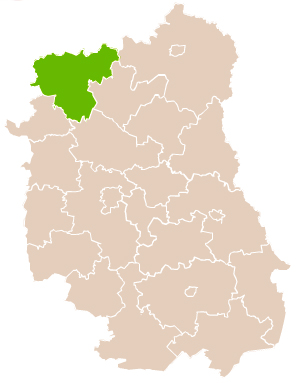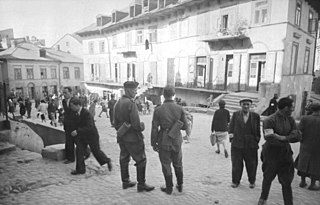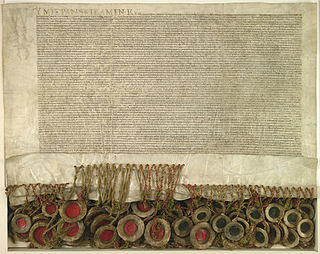
Lesser Poland, often known by its Polish name Małopolska, is a historical region situated in southern and south-eastern Poland. Its capital and largest city is Kraków. Throughout centuries, Lesser Poland developed a separate culture featuring diverse architecture, folk costumes, dances, cuisine, traditions and a rare Lesser Polish dialect. The region is rich in historical landmarks, monuments, castles, natural scenery and UNESCO World Heritage Sites.

Lublin is the ninth-largest city in Poland and the second-largest city of historical Lesser Poland. It is the capital and the centre of Lublin Voivodeship with a population of 336,339. Lublin is the largest Polish city east of the Vistula River and is about 170 km (106 mi) to the southeast of Warsaw by road.

Majdanek was a Nazi concentration and extermination camp built and operated by the SS on the outskirts of the city of Lublin during the German occupation of Poland in World War II. It had seven gas chambers, two wooden gallows, and some 227 structures in all, placing it among the largest of Nazi concentration camps. Although initially intended for forced labor rather than extermination, the camp was used to murder people on an industrial scale during Operation Reinhard, the German plan to murder all Polish Jews within their own occupied homeland. The camp, which operated from 1 October 1941 to 22 July 1944, was captured nearly intact. The rapid advance of the Soviet Red Army during Operation Bagration prevented the SS from destroying most of the camp's infrastructure, and Deputy Camp Commandant Anton Thernes failed to remove the most incriminating evidence of war crimes.

The Lublin Voivodeship, also known as the Lublin Province, is a voivodeship (province) of Poland, located in southeastern part of the country. It was created on January 1, 1999, out of the former Lublin, Chełm, Zamość, Biała Podlaska and (partially) Tarnobrzeg and Siedlce Voivodeships, pursuant to Polish local government reforms adopted in 1998. The region is named after its largest city and regional capital, Lublin, and its territory is made of four historical lands: the western part of the voivodeship, with Lublin itself, belongs to Lesser Poland, the eastern part of Lublin Area belongs to Red Ruthenia, and the northeast belongs to Polesie and Podlasie. Lublin Voivodeship borders Subcarpathian Voivodeship to the south, Świętokrzyskie Voivodeship to the south-west, Masovian Voivodeship to the west and north, Podlaskie Voivodeship along a short boundary to the north, Belarus and Ukraine to the east. The region's population as of 2019 was 2,112,216. It covers an area of 25,155 square kilometres (9,712 sq mi).

John Paul II Catholic University of Lublin is a university established in 1918. It is the only private college in Poland with the status of a university.
The Polish Women's Superliga, also known as the PGNiG Women's Superliga for sponsorship reasons, is the top women's handball league in Poland. The current champion is MKS Lublin

Maria Curie-Skłodowska University (MCSU) is a public research university, in Lublin, Poland. It is named in honour of Marie Curie-Sklodowska.

Lublin County is a unit of territorial administration and local government (powiat) in Lublin Voivodeship, eastern Poland. It was established on January 1, 1999, as a result of the Polish local government reforms passed in 1998. Its administrative seat is the city of Lublin, although the city is not part of the county. The only towns in Lublin County are Bełżyce, which lies 23 km (14 mi) west of Lublin, and Bychawa, 26 km (16 mi) south of Lublin.

Łuków County is a unit of territorial administration and local government (powiat) in Lublin Voivodeship, eastern Poland. It was established on January 1, 1999, as a result of the Polish local government reforms passed in 1998. Its administrative seat and largest town is Łuków, which lies 76 kilometres (47 mi) north of the regional capital Lublin. The only other town in the county is Stoczek Łukowski, lying 30 km (19 mi) west of Łuków.
KS Lublinianka is a Polish professional football club based in Lublin. It was founded in 1921 as WKS Lublin and was supported by the Lublin garrison of the Polish Army. In 1923 WKS Lublin was renamed to Klub Sportowy Lublinianka. In 1938 the club won the Football Junior Championships of Poland. They spent eleven seasons in the Polish First League and in the 1969–70 season they reached the quarterfinals of the Polish Cup. Lublinianka currently plays in the IV liga.

Chachmei Lublin Yeshiva was a Jewish educational institution (yeshiva) that operated in the city of Lublin, Poland from 1930 to 1939. At the time, it was one of the largest in the world.

Motor Lublin is a Polish professional football team based in Lublin. The club was founded in December 1950 with their nickname The Yellow, White and Blues reflecting their official colours. They compete in I liga, following promotion from the 2022–23 II liga.

The Nisko Plan was an operation to deport Jews to the Lublin District of the General Governorate of occupied Poland in 1939. Organized by Nazi Germany, the plan was cancelled in early 1940.

The Lublin Ghetto was a World War II ghetto created by Nazi Germany in the city of Lublin on the territory of General Government in occupied Poland. The ghetto inmates were mostly Polish Jews, although a number of Roma were also brought in. Set up in March 1941, the Lublin ghetto was one of the first Nazi-era ghettos slated for liquidation during the deadliest phase of the Holocaust in occupied Poland. Between mid-March and mid-April 1942 over 30,000 Jews were delivered to their deaths in cattle trucks at the Bełżec extermination camp and additional 4,000 at Majdanek.

The Union of Lublin was signed on 1 July 1569 in Lublin, Poland, and created a single state, the Polish–Lithuanian Commonwealth, one of the largest countries in Europe at the time. It replaced the personal union of the Crown of the Kingdom of Poland and the Grand Duchy of Lithuania with a real union and an elective monarchy, as Sigismund II Augustus, the last of the Jagiellons, remained childless after three marriages. In addition, the autonomy of Royal Prussia was largely abandoned. The Duchy of Livonia, tied to Lithuania in real union since the Union of Grodno (1566), became a Polish–Lithuanian condominium.

The European road E373 or E373 is a European road running from Lublin in Poland to Kyiv in Ukraine.

Krzysztof Andrzej Hetman is a Polish politician who has served as a Member of the European Parliament since 2014. Since December 2023, he has served as Minister of Economic Development and Technology.

Lublin District was one of the first four Nazi districts of the General Governorate region of German-occupied Poland during World War II, along with Warsaw District, Radom District, and Kraków District. On the south and east, it initially bordered the Soviet Union. After Operation Barbarossa, it bordered Reichskommissariat Ukraine to the east and Galizien District to the south, which was also part of the General Governorate.

The Lublin Triangle is a regional alliance of three European countries – Lithuania, Poland, and Ukraine – for the purposes of strengthening mutual military, cultural, economic and political cooperation and supporting Ukraine's integration into the European Union and NATO. The Lublin Triangle initiative invokes the integrative heritage of the 1569 Union of Lublin.

















